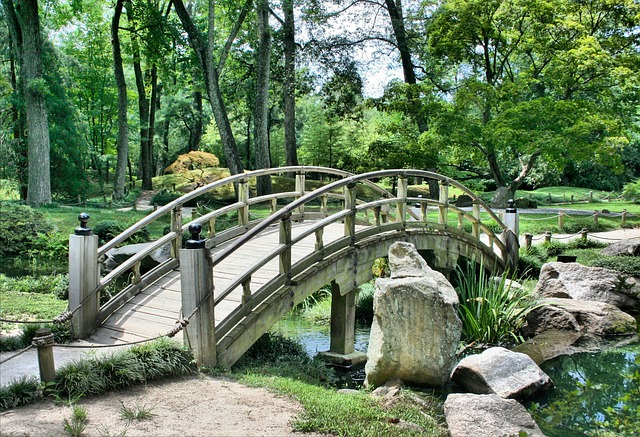So how much space do you need for a meditation garden? And what elements work best?
Actually, you don’t need much space. Once, in Houston, we turned a “patio” that was really just a 6′ x 8′ space between our apartment and the parking lot (separated by a 10′ fence) into a fairly nice little meditative garden.
And with two small children and two intense jobs, we needed it.
Since we didn’t have time for upkeep, that space was basically raked gravel, a couple of comfortable chairs, some decoration on the fence, a large umbrella for shade, and …. wait for it….. a wind chime (no wind, though…. HA).
So you don’t need a lot of space, money or work to have a little bit of calm somewhere.
Some things seem to show up more often than others. Here’s a list of common meditation garden elements.
If you think of some I’ve missed, or have a story about meditation gardens or how people react differently to these elements, use the comment bar below to let us know.
Shade. Very common. It’s difficult to be at peace when you’re sitting in the hot sun with sweat rolling off the end of your nose. Most people find forests to be peaceful places.
Green. The color itself is calming (”test prove…”). Most greenery is soft and multi hued. Native plants, by the way, are less work and are more likely to attractive local wildlife (that’s good).
Water. A lot of people find that being at the ocean is a calming experience. And there are babbling brooks and mountain streams. In the city, you might want a koi pond or a large pot with a hidden pump.
Seating. You rarely see photos of people meditating while standing up. The type of sitting depends on what you’re going to be doing. Sitting and having coffee with the spouse?
Chairs with arms and a possible table would be nice. Actually meditating (in a lotus position)? Just a mat will do. Getting some zzzzz’s? How about a hammock?
Birds. If you find watching and listening to birds relaxing, then you might want to add some things for our feathered friends – a bird bath, a bush to hide in, a plant with seeds that they might like to eat…. There are all sorts of ways to attract birds.
Placement. Think about the time of day you’ll (mostly) be using this space. Where is the sun? The noise? etc at that time of day.
Privacy. Only you know your need level for privacy, but most of us don’t want to be on display as we wind down. And creating a private place will also help eliminate the distractions of being able to see onto the street or into the neighbor’s yard.
A fence, a curtain, a bamboo roll, vegetation. There are all sorts of ways to obtain some privacy.
Noise. I’m not necessarily talking about unwanted noise. You should take unwanted noise into consideration, of course, and do what you can to lessen it. But there is good noise, too.
The birds, for instance. The water feature. Music. The area in the photograph of the last post (with the pink “snow”) has two small outdoor stereo speakers.
We usually don’t use them, but there are days when a nice quiet bit of relaxing music is just the right thing. Be sure that you don’t play it loud enough to disturb your neighbors, though.
Art. You’ve seen Gus, I assume. If not, look under categories for Our Garden, or just do a search of the word Gus in OUR search bar (not the main search bar).
We like art in the garden. We find it to be relaxing as well. It doesn’t have to be expensive. You can even make it yourself. Remember Sherry’s transformed birdbath? Art is good.
Scent. Mostly flowers, but I suppose that you could use incense or other substances too.
Just remember when you’re using incense that you need to be careful with any burning substance (especially if there’s a breeze) and that there are carcinogenic concerns about breathing ANY kind of smoke, cigarette or otherwise.
That being said, the scents of flowering plants can a great calming effect on the human body. Find the ones that work best for you.
You can find much more information on living a holistic lifestyle in these free magazines and on our YouTube channel.
Gabrielle Lim






